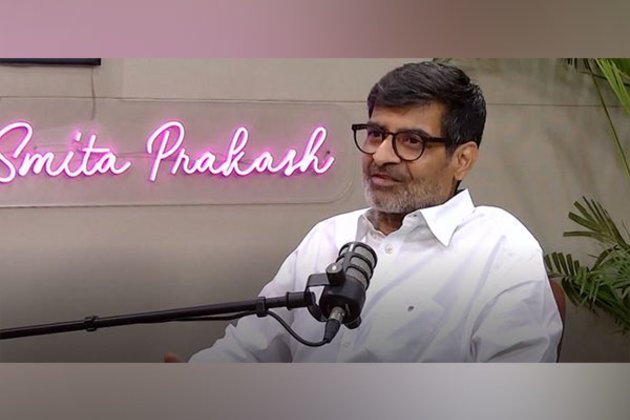

New Delhi [India], June 18 (ANI): Highlighting the unbroken partnership between the world’s two biggest democracies, US and India, Samir Saran, a geopolitical expert said that India is undergoing a transformation in its global role, thanks to Prime Minister Narendra Modi’s “muscular” foreign policies.
The President of the Observer Research Foundation (ORF) said that the United States branded India with a “Swag of 20 years later,” indicating the country’s newfound confidence and assertiveness while explaining how things have changed for India in the past years in the backdrop of Prime Minister Narendra Modi’s foreign policies.
Shedding light on India’s journey, in context with the West, the ORF President said, “When the US was making this decision, to suddenly re-imagine and brand India in a particular way, it had to sell it to its constituencies, to its partners to its own people.””There is no better country in the world when it comes to branding……..Americans are masters of branding…..we have moved from snake charmers to Tiger…….what Americans did was positioned India with “Swag of 20 years later,” he added.
In an exclusive interview with ANI Editor Smita Prakash, he said, “Even though today the leaders in the US may be fighting the elections on different issues but in the 20th century, in America, India was seen as a country close to Soviet Block.”Samir Saran also curates the Raisina Dialogue, India’s annual conference on cybersecurity and internet governance. His research focuses on issues of global governance, climate change and energy policy, technology and media, and India’s foreign policy.
Saran predicted that India will continue to become more vocal and confident as time goes on as Indian youth are more confident and assertive, having a clear vision for their country on the global stage.
Responding to how PM Modi’s foreign policies have impacted India today, Saran stated, “Second part is we also have to reimagine India’s role in the world, even if that takes time. Today’s youth is so different, they know what they want, and they have a strong view of their country in the world.
“You see a far more confident India today. Each year, every 5 years we are going to see certainly vocal and confident India,” Saran added.
He also explained how India went through a period of adjusting to its new realities, a reality which was looking far more wholesome at the prospects which were far more positive.
“India had not only grown, matured, developed certain skills, Indian industry, and Indian economic market side were beginning to contribute as well, that engine was finally firing,” Saran added.
The reforms of 1991 played a significant role in unleashing India’s potential, enabling it to escape the limitations of the public sector and contribute to global markets.
“We had in many ways escaped the shackles of the public sector. The 1991 reforms were beginning to kick-in,” he added.
Listing out the factors responsible for not continuing the upward trajectory during former Prime Minister Manmohan Singh’s second term, Saran said, “Manmohan Singh’s and Atal Bihari Vajpayee’s terms were similar. What happened post-2009, there was a resurgence of the other side of the Congress party, of the left-leaning socialist side that somehow made the then PM Manmohan Singh, guilty of wanting more for the country.”This shift in dynamics led to changes in key policies with the idea of millions of Indians living abroad being used as both a tool and a means of influencing policy decisions.
He also said that because there were these hundreds of millions of folks who were outside the country, that idea was used both as a tool and a means of changing some of the key policies, but also as a way of instilling a reluctant Indian story.
“It was at that particular time when former US President Barack Obama was elected in 2008, and he made a visit to Shanghai in 2009 and suggested G2. And if you look at the period when the Americans toyed with the idea of accommodating the rise of India while trying to manage the neighbourhood with China,” Saran added.
He pointed out that during former PM Manmohan Singh’s second term, India missed opportunities to forge closer ties with key global players.
“We (UPA government) did not continue to deepen, strengthen our relations with Americans, Europeans, Japanese, Australians and others at that particular time, so that period of 4 years, gave birth to Xi Jinping kind of geopolitics,” the ORF president said.
ORF helps discover and inform India’s choices. It carries Indian voices and ideas to forums shaping global debates. It provides non-partisan, independent, well-researched analyses and inputs to diverse decision-makers in governments, business communities, and academia and to civil society around the world. (ANI)
24World Media does not take any responsibility of the information you see on this page. The content this page contains is from independent third-party content provider. If you have any concerns regarding the content, please free to write us here: contact@24worldmedia.com

A Brief Look at the History of Telematics and Vehicles

Tips for Helping Your Students Learn More Efficiently

How To Diagnose Common Diesel Engine Problems Like a Pro

4 Common Myths About Wildland Firefighting Debunked

Is It Possible To Modernize Off-Grid Living?

4 Advantages of Owning Your Own Dump Truck

5 Characteristics of Truth and Consequences in NM

How To Make Your Wedding More Accessible

Ensure Large-Format Printing Success With These Tips

4 Reasons To Consider an Artificial Lawn

The Importance of Industrial Bearings in Manufacturing

5 Tips for Getting Your First Product Out the Door